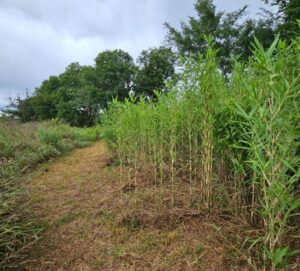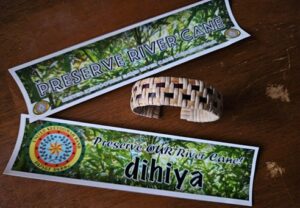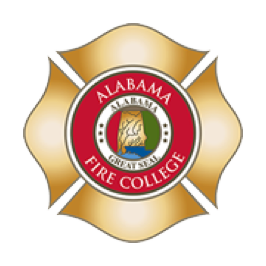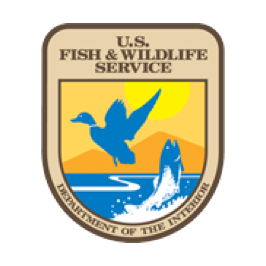United Keetoowah Band of Cherokee Indians Awarded Funds to Restore Endangered River Cane Ecosystems
Using America the Beautiful Challenge funding for ecological restoration and cultural preservation

Awarded funding through the America the Beautiful Challenge grant program, the United Keetoowah Band of Cherokee Indians is restoring endangered river cane ecosystems and preserving Keetowah traditions.
Tahlequah, Oklahoma – In 2022, the National Fish and Wildlife Foundation (NFWF) announced the America the Beautiful Challenge (AtBC) establishing five years of grant funding to support state, territory, and Tribal led ecosystem restoration. One of the fourteen Tribes awarded funding in the first round, the United Keetoowah Band (UKB) of Cherokee Indians, is utilizing AtBC funding to restore endangered river cane ecosystems within their homelands in Arkansas and Oklahoma.
In August, the Native American Fish and Wildlife Society (NAFWS) Executive and Deputy Directors, Dr Julie Thorstenson and Robert Romero met with UKB Tribal Ethnobotanist and Project Manager Roger Cain to see firsthand how America the Beautiful Challenge is supporting Tribal conservation.
The United Keetoowah Band and River Cane Traditions

A bracelet made of woven river cane.
The United Keetoowah Band (UKB) of Cherokee Indians were first removed from Tennessee to Arkansas and subsequently to Oklahoma in the early 1800s. Throughout these relocations, challenges posed by Oklahoma’s statehood, and finally federal recognition in 1949, the Tribe preserved their cultural practices and traditions
River cane, an evergreen bamboo endemic to North America, is integral to many traditional Cherokee practices used to make baskets, tools, weapons, construction materials for houses, and also for ceremonial purposes. Similar to aspens, river cane grows through rhizome networks creating large thickets or forests, called canebrakes, composed of only one or two plants. Historically, canebrakes were productive hunting grounds serving as critical habitat for many species including migratory birds, reptiles, black bears, and deer.
Once found along the East Coast and as far west as Oklahoma and Texas, river cane habitat was lost due to overgrazing, fire suppression, and the conversion of land for agriculture. Today, river cane inhabits less than 2 percent of its native range and canebrakes are considered endangered ecosystems. The UKB is now working to restore these habitats in Arkansas and Oklahoma while engaging the community and teaching traditional practices.
“Over the years, we’ve made the move from our mountain homes to the foothills, and we had a hand in acquiring the land we inhabit today. Through it all, we remain dedicated to telling the story of our removal and revival, and our project focuses on the restoration of culturally significant river cane, a powerful symbol of our heritage and resilience.” – Roger Cain, UKB Tribal Ethnobotanist and Project Manager.
Keetoowah River Cane Conservation Program

Roger Cain, UKB Tribal Ethnobotanist and Project Manager, explains river cane restoration and traditional uses.
River cane and canebrakes are now threatened by invasive species and changes in weather patterns. When Cain began studying river cane over twenty years ago, Tribal members had three patches of river cane to gather from and hardly enough to harvest for baskets: today there are none. Dedicated to supporting the resilience of river cane ecosystems and the preservation of Keetoowah traditions, UKB faced a challenge familiar to many Tribes: accessing funding.
“With only 72 acres of sovereign land and a membership of 15,000 enrolled members, we have limited revenue sources beyond federal programs and grants,” explained Cain.
The America the Beautiful Challenge provided an unprecedented funding opportunity for Tribal Nations to develop and implement restoration and conservation projects. Awarded $1.9 million in grant funding by NFWF through the America the Beautiful Challenge, the UKB is working to restore and manage endangered river cane ecosystems in their historic homelands and provide educational opportunities for Tribal members to carry on Keetoowah traditions.
While the Tribe will need to overcome challenges of restoration, including changing the community’s perception of river cane as a nuisance species, this project will have significant ecological benefits for the surrounding area. Canebrakes provide habitat for many species including threatened populations of freshwater mollusks and the endangered long-eared bat. River cane is also effective for erosion control and improving water quality as it can reduce agricultural runoff like nitrogen and phosphorus by 100% (Blattel, 2009).
In June, UKB began restoration efforts at public access areas along the Mulberry River. After clearing debris and removing invasive species, it did not take long for river cane shoots to emerge.
Supporting Tribal Conservation
In 2022, NFWF received $326 million in proposals from Tribal Nations through the America the Beautiful Challenge. While the program awarded a significant amount of grant funding to Tribes, $26.7 million, and will continue to provide grants through 2027, it also demonstrates the need for long-term, sustainable funding for Tribal conservation.
“It was an honor to learn about river cane restoration from Roger while surrounded by a plant so important to the Cherokee people and the wildlife of the area,” said NAFWS Executive Director Dr. Julie Thorstenson. “This project shows that supporting Tribes through programs like AtBC can have wide-reaching impacts.”
About Us
NAFWS is the only national Tribal organization with a specific focus on Tribal fish and wildlife resources. As a unique membership organization with 227 Support Member Tribes in 7 regions, NAFWS strives to meet the needs of its Individual Members and Member Tribes through conferences, trainings, youth education, and by participating with innovative projects and initiatives in Indian Country.






